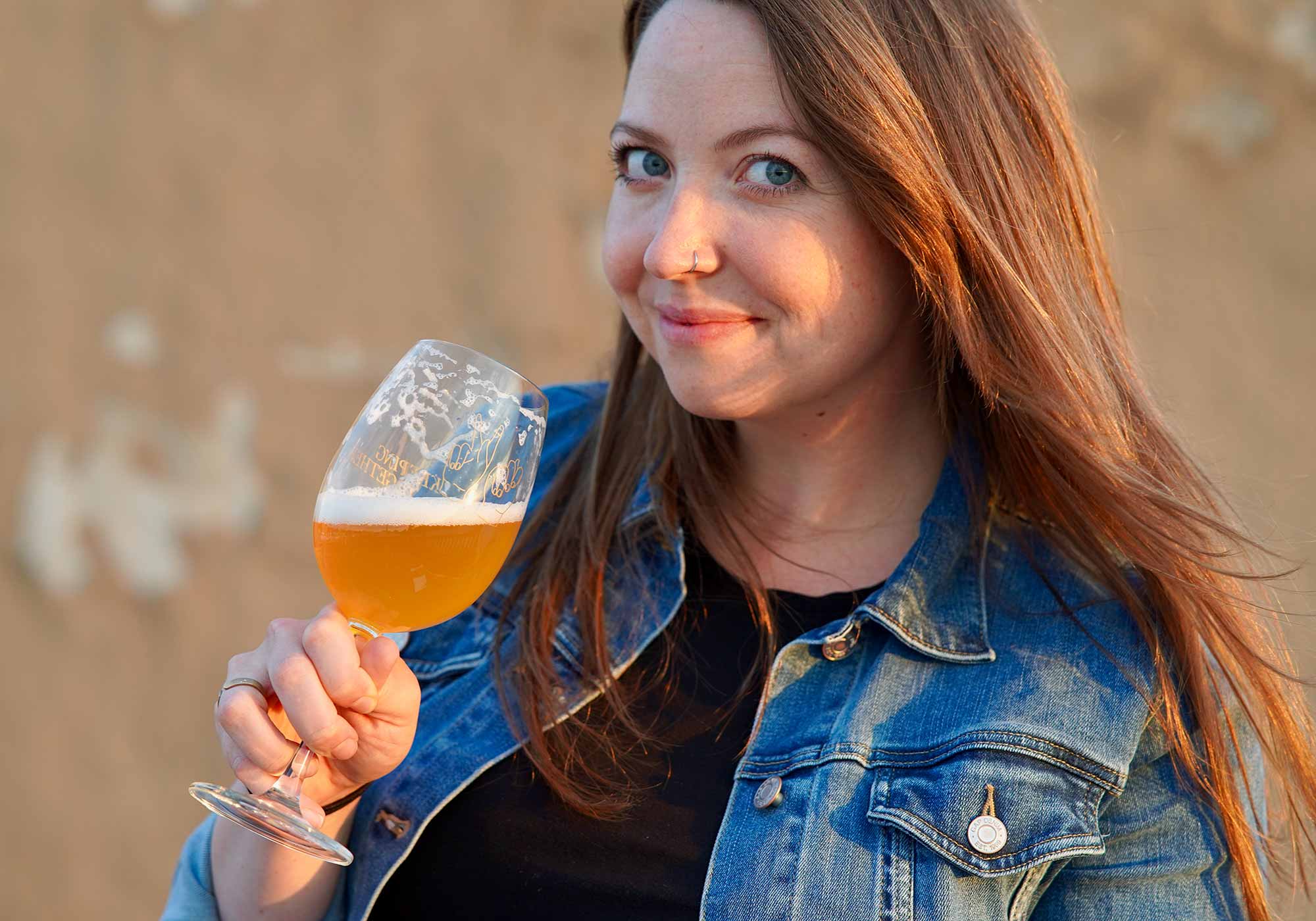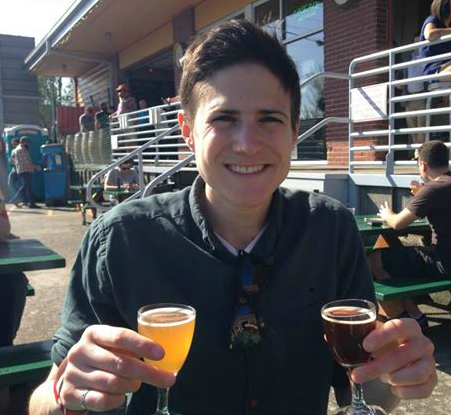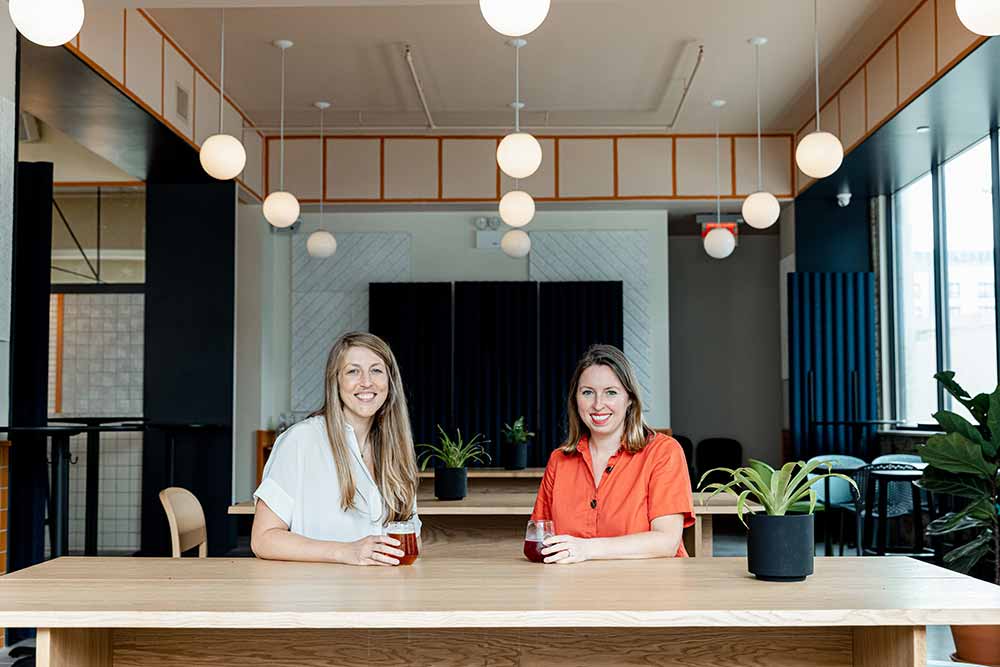Shop
15 Questions with Averie Swanson, Founder of Keeping Together and Former Head Brewer at Jester King
Imagine working your way up from volunteer to head brewer at one of the most renowned breweries in the world. A brewery you’ve helped build. A brewery you’ve helped make famous for producing world-class spontaneously fermented and mixed culture beers. And now imagine leaving it all behind to move to a different city. Crazy, right? But in 2019, former Jester King head brewer Averie Swanson did exactly that.
The move from Austin, Texas, to Chicago, Illinois brought many changes in Swanson’s life, but one of the greatest was the ability to put her vast knowledge and experience to the test at her very own place, an operation called Keeping Together. And the project, which produces mixed fermentation beers, is bringing (and keeping) together people of all backgrounds.
Most recently, Swanson became an ambassador for YETI, our presenting sponsor at our women in craft beer festival, Beers With(out) Beards. Swanson will be joining us for a conversation around her experiences on Saturday, September 18th, 2021. You can tune into the festival livestream here or check out the full schedule here.
Before the event, we wanted to sit down with Swanson to chat about the leap she took in moving to a new city to start her own venture, being authentic to herself as a beermaker, and fighting her own preconditioned societal responses to prove that she’s a powerful person in craft beer.
A Chat With Averie Swanson
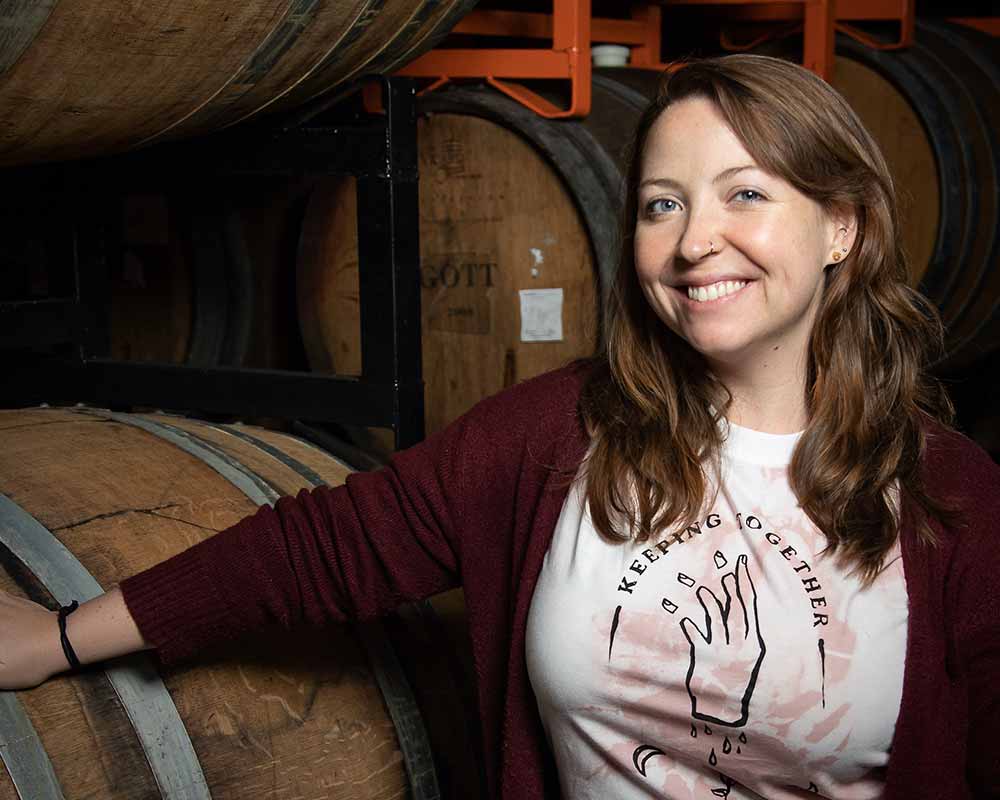
Photography courtesy of The Brewtography Project/Dustin Hall
Grace Weitz: You first volunteered at Jester King before working your way up to head brewer. Then, in 2019, you moved to Chicago. That’s a pretty big change. Why did you decide to make the shift?
Averie Swanson: To be honest, it was primarily for personal reasons. My long-distance partner at the time had been living in Chicago, so that was a big motivator. We talked about him moving down to Texas for a long time. But my mom was sick and I needed to take a break. I’d been traveling a ton and working a ton. The stars all aligned and the timing was such that I was able to put in my notice in October of that year and my last day was Dec. 31st of 2018. My mom passed away in April of 2019, so I’m grateful that I took the time to step away from my job and my professional obligations to spend some time with my family and make some life changes.
Part of the reason why I felt comfortable taking that leap and taking the time for myself is because I’d been at JK (sic) for a long time. I ascended the ladder there. There wasn’t anywhere else for me to go within that organization. I’d become an owner. I was on the leadership team. Though there was plenty of growth happening for me as a professional in the realm of learning how to better manage people and how to better manage a company, I felt like it was time for me to move out on my own, take that breather, and reevaluate what I wanted to do with my career.
GW: It looks like you’ve had that chance with Keeping Together. What was the one thing you took from working at a renowned spontaneous and mixed culture fermentation brewery and applied to your own endeavors?
AS: The majority of beers I’m making at Keeping Together are all stainless-steel fermented, mixed fermentation saisons with various adjuncts and fruit. I really love saisons. At JK (sic), there was a big focus on the more intense fruit refermentations… so it was nice being able to return to what parts of the process of beer making I really enjoyed and was passionate about.
This business is still pretty small. It’s still just me doing everything. I’m able to create this thing that’s manageable from a time and energy perspective. I’ve been able to achieve a work-life balance in a way that I didn’t have before I left Jester King.
In my twenties, I was really focused on doing as much as I possibly could to propel myself professionally. At this point, I’m not going to kill myself physically or mentally. I want to be able to live my life with my family and friends and be happy and feel fulfilled professionally.
GW: It’s so true that in your twenties you’re just gung ho all the time. But once you hit your thirties, you can’t really do what you used to, both drinking-wise and professionally.
AS: I catch myself. It’s challenging even to force myself to slow down. It’s been a little over two years since the first brew day at Keeping Together. I stripped everything down and got back to the basics and now I’m able to rebuild looking towards the future with this company, brand, and project.
I’m trying to figure out how I want to build this company into something bigger and more sustainable while still retaining that spirit of balance. I hate this word but I’m talking about authenticity. It’s such a terrible buzzword but I want it to be real, to be proud of it, and for people to enjoy the beers.
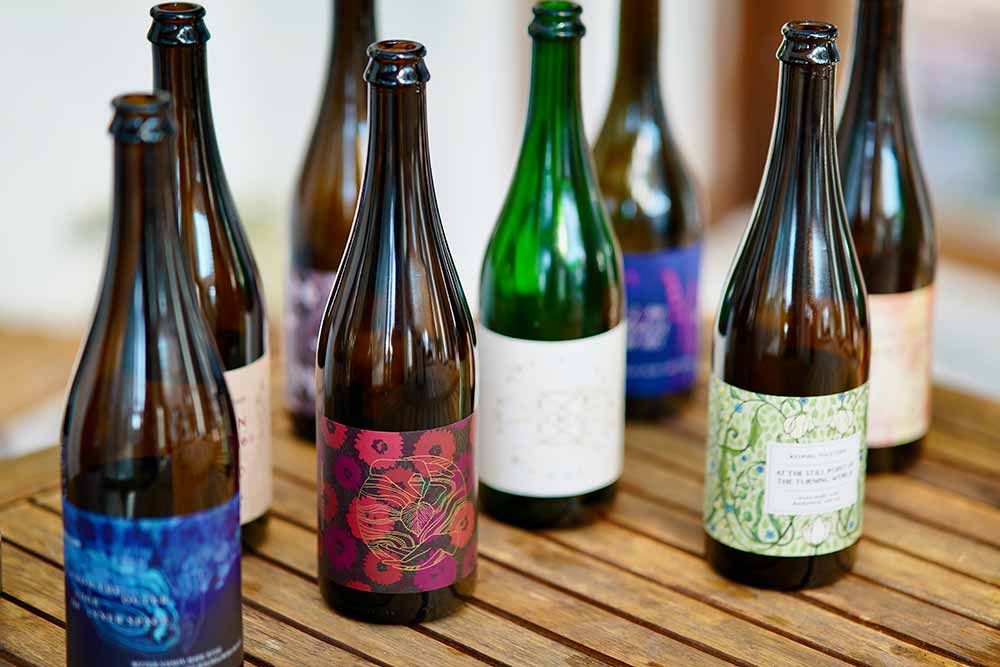
Photography courtesy of Averie Swanson
GW: In general, how did the idea first take shape for Keeping Together?
AS: Stylistically, I wanted to focus on what I loved about beer. I tried to really hone in on my philosophy as a beermaker. What’s important to me in that realm? What do I enjoy drinking from a purely hedonic perspective?
From a business perspective and industry opportunity perspective, in the summer of 2019 I looked at the landscape in the industry and there were so many breweries focusing on the hazy IPAs. There were tons of breweries that started in one school or philosophy or with a certain business model in mind, such as “We’re only going to do spontaneously fermented beer, sour beer, hazy IPAs,” or whatever. Plenty of people at that time pivoted away from their original business model of doing all X.
I felt like there was a fair amount of opportunity to come in and to share space with another brewery that… had tank space available. Where do the opportunities lie? How can I start something that’s not super capital intensive while still creating a symbiotic relationship with the host brewery?
Stewing on all of those things, this opportunity with Half Acre came up after talking with Gabriel, the founder there. They had space in their original brewery. The timing all worked out really nicely. I wanted to live in Chicago, I have roots here, my dad was born and raised here. I thought, Let’s move here, see what it’s about, and see where it goes from there.
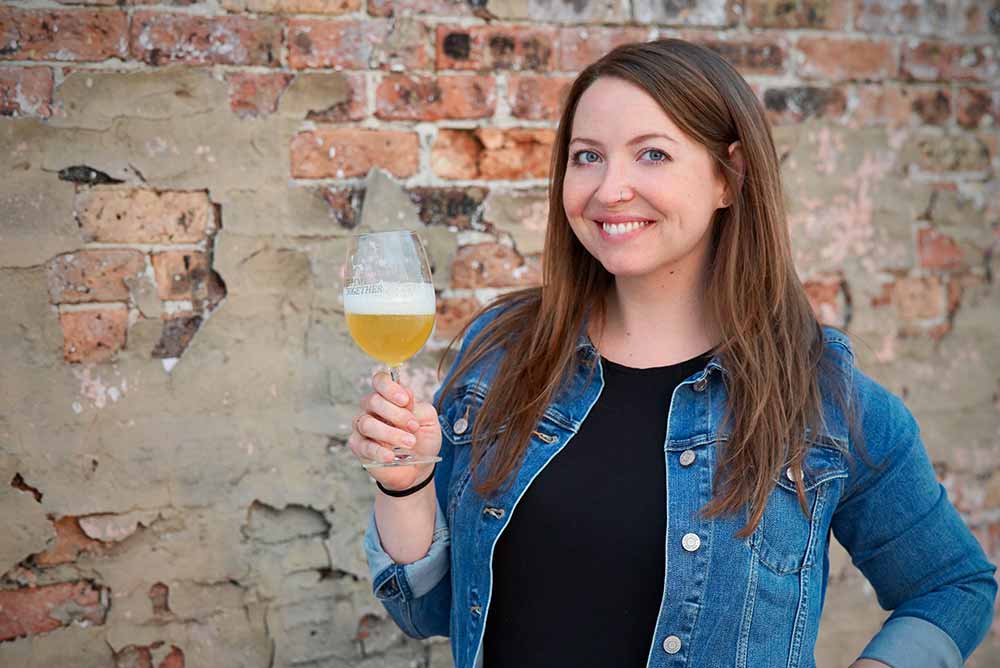
Photography courtesy of Averie Swanson
GW: With Keeping Together, it seems like you’ve been able to stay true to who you are as a brewer. One of the things I find really “authentic” about Keeping Together is that instead of brewing these haze bombs or fruit-packed lactose sours you essentially started by brewing a 3% ABV Table Beer. It’s totally different from popular trends and demands. How has that approach been received? Do you even care, because you’re sticking true to what you want to do?
AS: Plenty of times I asked, “Am I shooting myself in the foot by starting something so focused on a pretty niche type of beer making?” At the same time, I stripped down all of the excesses and figured out my actual philosophy as a beermaker. What draws me to this medium? Making these beers has been the only way to have that introspective and exploratory type of experience. It’s what I know. It’s what I really enjoy. I’m more focused on enjoying the process.
I don’t want that evolution of who I am as a maker or the brand I’ve created to hinge on forces of the industry or market. I want it to be a natural evolution of who I am as a maker.
Beyond that, the beers have been fairly well received in Chicago. It’s not an easy beer market; there are over 250 breweries in the Greater Chicago area, which is absolutely mind-boggling to me. I came here with the expectation that most people were not going to be into the beers because it’s very much a hazy IPA and pastry stout city, but I’ve been pleasantly surprised at the reception. There are definitely people who appreciate saison.
But it’s been challenging because the market has been so volatile over the last couple of years due to the pandemic.
GW: Yes, the pandemic has certainly been challenging. But I’m also wondering have you faced any hurdles as a woman in the industry? And how have you overcome them?
AS: I’ve had my fair share of experiences over the almost nine years I’ve been in the industry. Everything from microaggressive comments from both men and women to the internalized misogyny that all of us carry to some degree because we’re conditioned in society. I even catch myself regularly experiencing my own internalized misogyny. I can’t be that assertive when I’m asking for correction on the ways that my beers are being poured, or how people are talking about them because people will think I’m a bitch. I should be able to talk about something that I’m a category expert in without feeling like I’m being too assertive. That’s something I feel like I pretty regularly experience.
GW: That’s crazy because you’re one of only nineteen Master Cicerones in the world right now, so you should feel confident in your knowledge. Because it has literally been proven. It’s so interesting that you say you have your own internalized stereotypes that cause you to pause, because even though you have all this knowledge, you don’t want people to perceive you as a bitch. That’s just straight-up societal conditioning.
AS: Becoming aware of that thought pattern has been extremely valuable for me. Having this business, making these beers, and being pretty isolated, I don’t have a buffer between myself and the way the company is perceived by others on the outside.
When I was at JK (sic), if people didn’t like the beers, I never felt I was personally attacked because they didn’t like this thing I created. There was enough of a buffer between other people, the business, and the brand. There wasn’t the same degree of vulnerability. My time with Keeping Together has been an exercise in exploring that vulnerability. Perhaps it has resulted in me becoming more self-conscious in the way I put myself out there in the world because it’s very much up for discussion. There isn’t that comfort zone, safety, or buffer.
With Keeping Together, it’s very much just me. I find myself constantly checking the language I’m using when I write about the beers or speak about the beers. I want the beer and the business to be inspiring to people. I’m constantly checking myself for those conditioned responses… It’s definitely pushed me more in this direction of being more thoughtful about the way that I’m putting things out into the world.
GW: The real question is, if a man were in your position, would they be thinking something similar, worrying about the language, etc?
AS: Probably not. I would put money on not.
GW: That’s the tragedy.
AS: It’s a tragic irony. I wish I could put things out there and not care as much, but that’s not who I am.
GW: I completely get that. With Beers With(out) Beards, I’ve put so much of myself into this festival. And just like with you and Keeping Together, it’s something you created from the ground up. I try not to take everything personally, but ultimately, I do. Just ask my wife!
AS: It’s hard to compartmentalize it. People are really drawn to that authenticity and that rawness of who you are as a human. I want to honor that for other people and for myself. But it’s not easy all the time. I do think you’re right. For a lot of men in the world generally, and especially in the industry, no one has ever questioned them or made them feel like they weren’t supposed to be there. They just do what they do.
There have been so many times in this industry where I felt I did not belong. Had I been thinking about this really deeply five or ten years ago, that version of me that past self would have been far more eager to prove those people wrong and to say, No, I absolutely fucking deserve to be here and I will prove to you why I deserve to be here.
Whereas now I feel less aggressive about it. I would rather plant seeds of questioning why this industry is the way it is or why society is the way it is. I don’t have answers, but I have plenty of questions. I love the idea of planting those seeds of questions in people’s minds and just asking them why the world is the way it is. How can it be different?
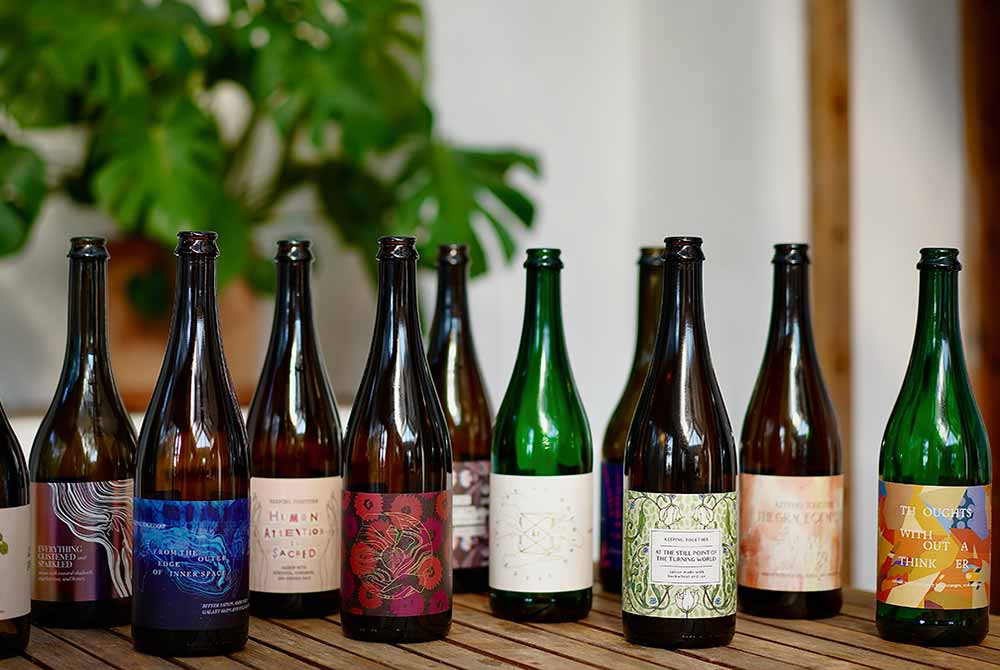
Photography courtesy of Averie Swanson
GW: It seems like that’s exactly what you’re doing at Keeping Together. Beer is your platform.
AS: [Yes, for example,] the names of my beers are very intentional. A lot of times, they’re points of meditation. If you were to really sit with this name, this phrase, or this string of words how does it make you feel? What does it mean? I don’t always put out information about what the name means to me because I want people to think about it and fill in the blanks for themselves.
GW: Can you give one example of a beer name like this?
AS: I’m releasing a beer this week called Make Art Not Content. It’s a beer with Ethiopian single-origin coffee roasted by the folks at Metric Coffee here in Chicago. I’m releasing it on Friday. It’s made with peach leaves, sage, and refermented with honey. The idea is to make something that you’re proud of. I feel like so many of us pour our talent into things that are iterations of other things. You’re doing it because you feel like you have to do it. Social media has become so pervasive in our everyday lives that you’re just creating things to put them out there. If you really sit down and think about something before putting it out there, would you consider this to be art? Would you consider this to be a piece of your soul or reflective of who you are and what really matters to you? What are you trying to communicate by putting this thing out into the world?
It doesn’t have to be content for the sake of content. It can still be beautiful. It doesn’t have to be something elaborate. Be thoughtful in the thing you’re making because there’s tons of stuff out there that doesn’t carry as much meaning as it could.
GW: I hear you. Is that why you decided to join YETI as an ambassador? Why did you think YETI would be a good brand to align yourself with?
AS: Tim Adams from Oxbow is a really good friend of mine. We traveled the world and made beers together. I honor and respect him as a maker, a human, and as a friend. He’s been an ambassador for them for a while. He asked me to come on and do an interview for Flight School, which is a series of IG Lives they did. I had a really great time chatting with him about beers. Education has always been something I’ve really enjoyed. But in the beer industry, there are so many people that already think they know everything. So it’s hard to have true engagement. So I really enjoyed the opportunity to talk to folks outside that circle. It gave me a fresh perspective on how beer is enjoyed and perceived in a world outside the industry. It’s easy to get jaded.
They asked me at the end of last year to come on as ambassador. It wasn’t an immediate yes for me because I wanted to make sure I was aligning myself with people who shared the values that I hold. What would make sense for both our brands? But everyone at YETI is really incredible. They developed their brand in such a way that there is so much intersection between the different markets they catered to and focus on. It was an experience I had never had access to before getting to experience what it’s like to interact with a large company that is globally known. Seeing how they’re engaging with their consumers has been pretty valuable for me. Overall, they’re really good people and life is too short to let really good people go. It felt right to me.
They’ve been very encouraging. I don’t feel like I’ve had to compromise any of my values or things I’m excited about to work with them. It feels like it has been a pretty symbiotic and positive experience for me.
GW: Obviously, YETI is our presenting partner for this year for Beers With(out) Beards and we’ve worked with them on Queer Beer, so we similarly feel that they align with our values and mission. They really have the power to have an impact in the industry.
AS: We need to be able to have conversations with each other. To find those areas of commonality that overlap, the intersection of we do carry the same values. This planet is important if we want to continue to enjoy the outdoors and the natural beauty that exists around us. Let’s focus on what brings us together as opposed to what divides us. Framing it that way gives me goosebumps. That is exciting to me, being able to meet people in the middle and find out: What will make the future easier and better for all of us?
GW: That’s where we can affect the most change. People ask me all the time, Is BW(O)B just for women? No! It’s for everyone, whether you identify as a woman with a beard, a cis-woman, a trans woman, or a cis-man. However you identify across the gender spectrum. Because that’s where the real conversations have to happen. If it’s just you and me talking to each other, we’re already on the same page. I don’t have to change your mind, right? It’s other people’s minds I have to change.
AS: Exactly.
GW: To wrap things up, what does the future look like for you and Keeping Together?
AS: Half Acre has sold the facility I’m making all my beer in. It was a natural thing that needed to happen. I’m excited for them. Hop Butcher is moving into that space. I’ve been planning for that. I mentioned earlier that Chicago is not my forever home. I’m currently looking for a permanent location for Keeping Together in the American Southwest. I’m looking more towards the New Mexico/Arizona area. I have not found a property just yet, so it’ll end up being a little while before we’re up and running, but in the next year or two, I’ll be in the process of finding a new home and building a new brewery, and developing a destination space for people to come and enjoy the beers. I’m looking forward to being able to host people in a true Keeping Together space and being able to offer people hospitality and space to be who they are and to enjoy the beers.

